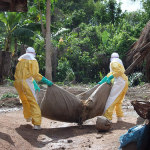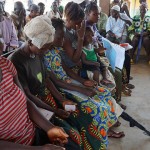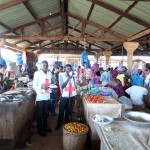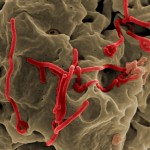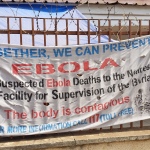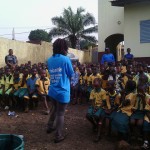Background: A major challenge to outbreak control lies in early detection of viral haemorrhagic fevers (VHFs) in local community contexts during the critical initial stages of an epidemic, when risk of spreading is its highest (“the first mile”). This paper documents how a major Ebola outbreak control effort in central Uganda in 2012 was experienced from the perspective of the community. It asks to what extent the community became a resource for early detection, and identifies problems encountered with community health worker and social mobilization strategies.
Continue reading →
The Ebola outbreak in West Africa differed from others in its unprecedented size and the high proportion of human-to-human transmission occurring in the community. This report presents an analysis of the impact of Community Care Centres (CCCs) on communities in Sierra Leone. Much has been written about the leadership and coordination of the response – or the lack of it. The emphasis of this evaluation is on the views on the development, implementation and relevance of the CCCs from the perspective of the communities next
Continue reading →
The present document is the eighth and final report in a series presenting descriptive results of a survey of responses to Ebola and Ebola control in 26 villages in all three provinces of rural Sierra Leone, fieldwork for which was undertaken in December 2014. The report covers three villages in Gbo chiefdom, in Bo District. Some emphasis is placed on how inconsistencies of Ebola response are perceived at local level, and undermine trust. Ebola responders should not only improve the quality of their messages, but
Continue reading →
The four villages in this report are found on the edge of the Gola Rainforest National Park, Sierra Leone and have been studied by members of the present team at intervals since 1987. The aim of this long-term study was to understand social composition and social change in forest-edge communities, and how these communities were adapting to conservation rules and opportunities. These villages have now been restudied as part of the SMAC community mobilization program for prevention of Ebola Virus Disease. This study, which was
Continue reading →
This study aimed to support Oxfam’s Public Health Promotion (PHP) strategy through a rapid qualitative assessment of the remaining social barriers to compliance with Ebola prevention and treatment messages. At the time of the study, most Liberians had a high awareness of Ebola prevention and treatment information. However, new infections continued to occur in “hot spots” around the country. A preliminary assessment suggested that negative perceptions and fear of Ebola response efforts contributed to non-compliance and resistance in some areas. Research activities assessed the sources
Continue reading →
This working paper reports on a study to identify the pace of Ebola-related social learning in urban and peri-urban areas around Monrovia, Liberia during August 2014, at the onset of the emergency phase of the epidemic. The research demonstrates how under conditions of accelerating health crises, social learning is rapid even in a context of heightened instability, suspicion, and misinformation. Misleading information in the form of local rumours and unhelpful government and international healthcare messages complicate this process and can produce anxiety. However, contrary to
Continue reading →
This working paper reports on a study to identify epidemic control priorities among 15 communities in Monrovia and Montserrado County, Liberia. Data were collected in September 2014 on the following topics: prevention, surveillance, care-giving, community-based treatment and support, networking/hotlines/calling response teams and referrals, management of corpses, quarantine and isolation, orphans, memorialization, and the need for community-based training and education. The study also reviewed issues of fear and stigma towards Ebola victims and survivors, and support for those who have been affected by Ebola. The findings
Continue reading →
This paper by Anoko J. N., reports on the success of a communication programme among 26 rebellious villages in Forest Guinea during fieldwork in June-July 2014. This was based on listening to complaints and taking into account the customs and culture of those concerned. The main methodologies were socio-anthropological enquiry and action research, based on bibliographic research, observations, formal and informal interviews with resource persons and political leaders from Forest Guinea; women , young and very old people of both sexes, street vendors, restaurateurs, local
Continue reading →
